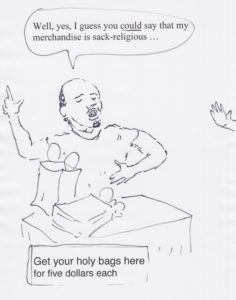Indonesian seminar on miracles, 7.3
24 minutes, in English and Bahasa; spiritual warfare, spirits, etc.
Punished for Hope in God—Exodus 5:4-9
Pharaoh insults God (Exod 5:2) and orders his slaves to just get back to work (5:4-5). He treats their request for a religious festival as nothing but an excuse to get off work. Even though most people in antiquity allowed for the existence of other people’s gods, Pharaoh assumes that the Hebrews’ god must be very weak, since powerful Egypt, with its powerful gods, has enslaved the Hebrews.
Moses and Aaron do not yet offer signs—perhaps they were ushered from Pharaoh’s presence before they could do so (or perhaps we just do not receive enough details to understand that the instructions are for later; cf. 7:20, “as the Lord commanded”). But Pharaoh in any case offers a response much more massive than signs such as turning a rod into a snake or making one’s hand look leprous. He punishes all the Israelites because they have put forward leaders asking for a holiday. Egypt had festivals for its gods, but Israel could have none for theirs. It seems highly unlikely that Pharaoh was giving them their weekly sabbath either. Pharaoh acts with a firm hand to quell any thought of asking for concessions.
After all, “the people of the land are many” (5:5), a problem that generated their enslavement to begin with (1:9-11). Their being “many” also meant that asking for a holiday would interrupt the productivity of a great work force. To teach them not to look for time off, Pharaoh shows them that even requesting such concessions will only result in further punishment, a heavier yoke. Now they had to gather their own straw for the bricks without reducing their brick quota. Although Pharaoh was not doing the work himself, he was ready to demand a humanly impossible output from those he oppressed.
Pharaoh complains that the Israelites are “crying out” to him for relief (5:8); soon they will instead “cry out” to him because of the very order he now gives (5:15). (Ironically, when Egyptians cried to an earlier Pharaoh, he sent them to Joseph for relief, Gen 41:55.) Yet it is the Lord who has truly heard his people’s “cries” (Exod 3:7, 9), because he hears the cries of the oppressed (22:23, 27; cf. Gen 4:10). Likewise, it is to the Lord that Moses will continue to cry (Exod 8:12; 15:25).
And because the Lord hears the oppressed, soon there will be a “cry” of agony in Egypt as the roles of suffering are reversed (11:6; 12:30).
So Pharaoh increases their “work” (Exod 5:9; already harsh in 1:14; 2:23), undoubtedly assuming that he is ensuring that they will not ask for relief again. Pharaoh undoubtedly congratulates himself on making his point to the slaves, and probably is congratulated with hearty laughter from his courtiers.
The slave-drivers employ a formula not unusual for decrees: “Thus says [the king],” in this case, “Thus says Pharaoh” (5:10). This formula highlights, however, the extent to which Pharaoh is defying and challenging the authority of YHWH, for it evokes YHWH’s own command in 5:1. When Moses and Aaron had come to Pharaoh, they had declared, “Thus says the LORD, the God of Israel, ‘Let my people go …’” (cf. also 4:22).
To the Israelites themselves, it must appear as if the flesh-and-blood Pharaoh holds the real power that their invisible God does not. But the Lord will soon surprise everybody with his works for which no one yet had much faith. His chosen time to act had come.
Tolerance except of intolerance
Indonesian seminar on miracles, 7.2
24 minutes, in English and Indonesian
When People Belittle God—Exodus 5:1-5
Presumably presented by the elders as representatives of Israel or Israel’s God, Moses and Aaron obtain entrance before Pharaoh (cf. 5:15). The Israelites were a significant work force, and their leaders, even if not favored, would be able to bring petitions before Pharaoh on behalf of the people. Moses and Aaron deliver the word of the Lord, but it is no minor request (5:1). They ask only for a festival in the wilderness. Nevertheless, as far as Pharaoh is concerned, this could be a pretext for escape or (cf. 1:10) even revolt. Though Pharaoh could quickly overtake them and quash any rebellion, he has the complete upper hand and lacks reason to cooperate to begin with.
So Pharaoh responds with disdain (5:2). Had Pharaoh heard that Israel had a god? Probably. Did he know that this God’s name was YHWH? Probably not. But the issue here is not so much this God’s name as his power. Pharaoh believes that he has many gods, powerful gods that made Egypt a mighty empire, and Israel’s God had not protected them from slavery. “Who is …?” and “I do not know …” were both sometimes ways of denigrating someone, treating them as unworthy of respect or knowledge (cf. 1 Sam 25:11; Matt 7:23; 25:12; Luke 13:25, 27).
Moses and Aaron elaborate: if they disobey the command of their God who appeared to them, God might be angry with them and punish them with plague (davar) or sword (charev). Perhaps they are too timid at this point to speak of judgment against Pharaoh, but surely he could recognize that judgment on the slaves would hurt Egypt’s economy. Egyptians offered massive sacrifices in official temples; they would understand that people had to supply what their gods demanded. Yet Pharaoh is unwilling to negotiate with slaves or even with the gods of slaves; he acts as if Israel’s God is nothing, and so begins his open defiance of Israel’s God.
Moses and Aaron are surely disappointed by Pharaoh’s response—even though it is exactly the response that God already warned about. Should we be surprised that only some of those who witnessed Lazarus raised from the dead in John 11 believed? Should we be surprised if some people reject God’s signs today and the most logical arguments for him? I have often struggled with self-doubt when anyone is not persuaded by my arguments (that’s why in my more academic books I work hard to make a strong case).
But over the years I have learned that just because someone isn’t persuaded doesn’t mean that it’s a bad argument. (If that were the case, almost all arguments would be bad, because very rarely is there an argument, at least in the humanities, that persuades everyone!) And just because someone isn’t convinced by something God does—whether in creation or in special divine acts today—doesn’t mean that God has not given them enough evidence to hold them responsible for their choices. The Bible speaks of moral blindness. Pharaoh’s theology keeps him blind; he cannot submit to Israel’s God and yet regard his own gods—and himself as a god—as more powerful than Israel’s God.
In the end, Pharaoh will be proved wrong. But in the meantime, will God’s people, oppressed and abused by Pharaoh, keep the faith? Likewise, when the arrogant browbeat God’s children today, we should continue to trust God, who will in due time vindicate his name as he has done repeatedly through history.
Fringe sects
Symbolic language in Revelation
Some people say to take everything in Revelation literally. But Revelation stops to explain some of its symbols, and some other images are also clearly symbolic.
Indonesian seminar on miracles, 7.1
24 minutes, in English and Bahasa
Excitement versus Tested Faith—Exodus 4:30-21
Moses and Aaron gathered the elders of the people, who would have at least heard of Moses, the Hebrew who had been adopted by an Egyptian but ultimately sided with the Hebrews. The elders presumably then gathered the people (4:29-30).
When the people heard the long-for message of liberation and saw the signs, they believed (4:30-31), so grateful to discover that YHWH had seen their suffering and had determined to act (4:31). But this is what many interpreters of John’s Gospel call preliminary “signs-faith.” Certainly they believe now; but when hardship increases and their faith is tested, they will complain against Moses and Aaron for misleading them (5:20-21). And Moses—also not yet a model of great faith—will ask YWHW why he had misled Moses (5:22-23).
It’s often easy to trust God and his plan when initial signs kindle our hopes. But hardship often crushes such hope, and our elementary faith is revealed for what it really is. Sometimes when we are tested we tend to yearn for our pre-tested level of faith. But it is faith that has endured testing that is truly mature faith. Testing offers us opportunities to mature in our relationship with God, uncomfortable as the growing pains are. Sometimes just clinging to God for dear life in the midst of testing is a greater demonstration of faith than our apparent faith when everything is going well!



